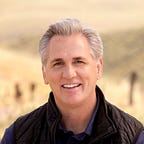Preserving the Integrity of Our First Amendment
--
A month ago, Facebook CEO Mark Zuckerberg announced Facebook would not ban political ads, arguing in part that he does not believe private companies should “censor politicians or the news in a democracy.”
I expressed then, as I still believe now, that this is the right decision.
Since then, recent developments in the technology industry — as well as gilded rhetoric I’ve been hearing from my colleagues on the left regarding free speech — has only fortified this belief.
Facebook later added that “in a democracy, people should decide what is credible, not tech companies.”
Indeed, it is not Facebook’s job to decide if my posts, or any Member’s posts, fare worthy of publication.
But not everyone, and most certainly not those on the left, agree with this.
Sen. Elizabeth Warren went so far as to post a knowingly false ad on Facebook, to which the company aptly responded that if Warren wants to post false things online, it isn’t Facebook’s job to stop her. The underpinning of this defense is built on preserving the integrity of our First Amendment, and we should let nothing degrade that.
“…in a democracy, people should decide what is credible, not tech companies.” -Facebook Inc.
But some technology companies have heeded the call to limit speech. Twitter CEO Jack Dorsey announced Twitter would ban political advertising and “issue ads.”
In practice, it will be nearly impossible to objectively enforce an insincere policy such as this, and Twitter’s rollout has already revealed its cracks. Last Friday, Twitter walked back its blanket ban on political and issue ads, instead opting for a more convoluted policy.
Those defending a ban on political ads are claiming it’s to combat misinformation. They — including many in the media — insist that enough political ads are false that they should be banned altogether. They believe this issue is so pervasive it is worth cutting off sources of information for millions of Americans.
I fear this is all part of a grander plan.
Since our nation’s founding, the freedom to speak and access that speech has been the bedrock of our democracy.
America was designed to challenge us, not to incubate group think.
As an American, you must be free to voice your opinion, and you must have access to all the information about the topic you are formulating that opinion on. People won’t always agree, but that’s the point.
But lately, the left has sprouted a strange obsession with tweaking this system in their favor by restricting information. It hasn’t been a loud door slam on free speech, but rather a slow chipping away at the First Amendment through various regulations, legislative attempts, and public pressure and intimidation.
The end goal is clear: to create an information desert in places they think Americans shouldn’t make decisions for themselves.
“America was designed to challenge us, not to incubate group think.”
The election of Donald Trump has lit a fire under these efforts. They will do anything to avoid a repeat of 2016.
It wasn’t long ago the media and the left championed President Obama’s campaign team for its savvy data operation and its ability to reach and uncover millions of Americans online.
But then in 2016, Donald Trump’s team won the election using the same resources.
Now, the left doesn’t find these strategies so savvy. It is now “disturbing” and dangerous for those with dissenting views, let alone conservative views, to occupy too much of the information space.
Removing or restricting certain political and issue ads from platforms that large pockets of the country use to stay up to date is all part of a grander effort to limit the information people receive to inform their ideas. Many on the left know this.
What they fail to acknowledge, however, are the implications the ban will have on the battle between new ideas and the status quo.
Candidates like Alexandria Ocasio-Cortez, Andrew Yang, and Dan Crenshaw who enter their races with little name recognition depend on the model we have in place. And Americans across the country depend on it as well come election time. They deserve to hear the voices of grassroots organizations and candidates in order to make an informed decision on what is best for our country.
Banning political ads is not a solution to anything. It merely shifts the discussion of misinformation campaigns, it doesn’t solve it. We won’t be arguing over whether an advertisement is true or false. We will be arguing whether an advertisement constitutes a political issue or not. This is precisely the confusion Twitter has set off with its new policy.
“Removing or restricting certain political and issue ads from platforms that large pockets of the country use to stay up to date is all part of a grander effort to limit the information people receive to inform their ideas. Many on the left know this.”
Right now, there is a loud minority making substantial efforts to undermine free expression and speech. While I believe the inherent rights and values of our nation will ultimately prevail, these intrusions on our democracy must not go unnoticed.
Whether we like what we hear or we don’t — I’ll always stand on the side of its freedom to be said.
